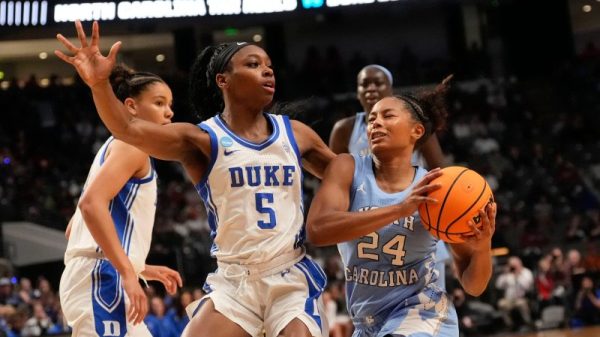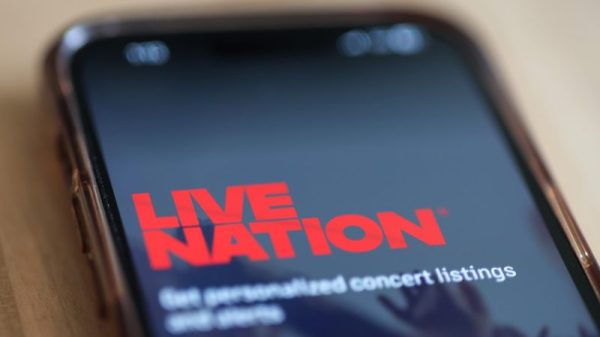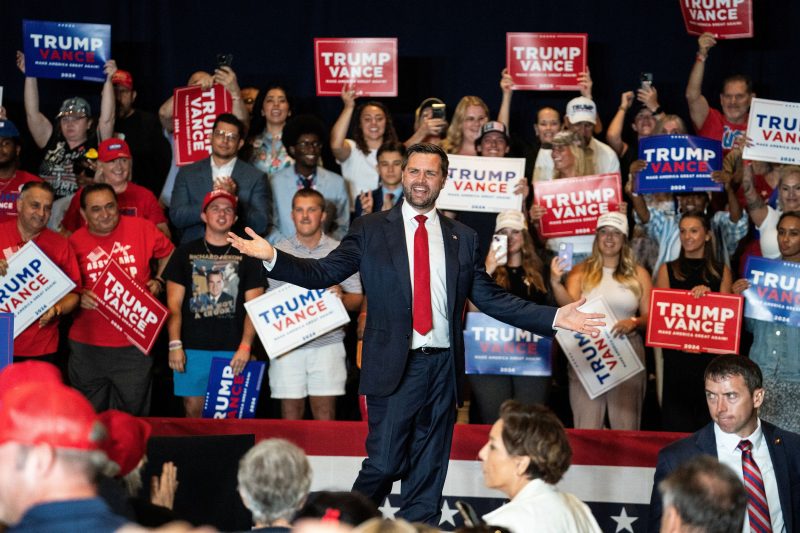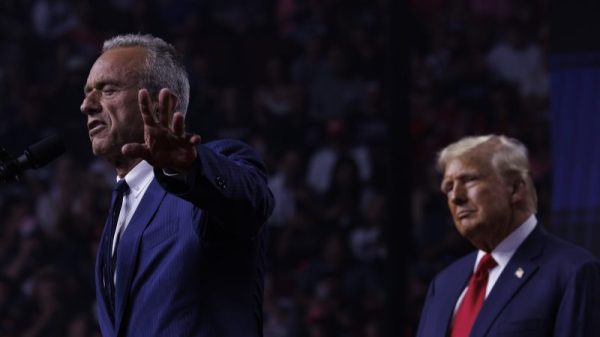One of the defining characteristics of Sen. JD Vance’s (R-Ohio) politics, at least since his rebirth as a far-right voice and an acolyte of Donald Trump’s, is that Americans should have more kids — and that Americans without kids are not full participants in the American experiment.
Since Vance was tapped as Trump’s running mate, examples of his disparagements of childless Americans have trickled out, a byproduct of his affinity for granting interviews to ideologically aligned podcast hosts. But it’s not like this was a secret. When he was first running for the Senate, he suggested that childless Democrats lacked a “personal and direct stake” in the future of the country. It’s just that more people are now paying attention.
This position is intertwined with Vance’s views of immigration. The percentage of Americans over the age of 65 is increasing, thanks to the baby boom, and that means that the ratio of taxpaying, working-age people to those needing the government programs funded by those taxes is getting out of whack. One way to address this is to make it easier for people to come to the U.S. and work. Another is to get Americans to have more babies. In Vance’s estimation, the idea that the country would prioritize the former over the latter is “sociopathic.”
His position, though, is also informed by his expectations for those Americans once the children are born. Finding the costs of child care burdensome? Well, ask your parents. Worried about your kids getting shot to death at school, as two were in Georgia earlier this week? Well, that’s just a “fact of life.”
When Trump’s opponent, Vice President Kamala Harris, suggested that this was a fatalistic way of looking at the problem, Vance suggested that she was “[lying] about what I said.” But that is, in fact, what he said at an event in Arizona.
“The states with strict gun laws, they have a lot of school shootings,” Vance said as he began addressing the subject. “And the states without strict gun laws, some of them have school shootings too. So clearly strict gun laws is not the thing that is going to solve this problem.”
We should interrupt here to note that this is misleading, for a few reasons.
The first is that no state has “a lot” of school shootings. In 2022, there were about 63 million people in elementary, middle and high schools in the U.S., 55 million of them students. School years run about 180 days each year, meaning that there were about 11.3 billion person-days spent in schools that year, 10 billion of them students.
The year 2022 was a particularly bad one for school shootings, following the surge in violent crime that accompanied the coronavirus pandemic. According to data compiled by Everytown for Gun Safety, which supports gun safety laws, there were 117 incidents in which firearm attacks occurred at American schools, killing 53 people and wounding another 138. Many of those incidents involved disputes outside of the schools that didn’t involve students or staff.
The total is grim and tragic, but it is also, happily, a tiny fraction of all the school days that unfolded without such incidents that year.
It’s also not the case that school shootings are worse in states with strict gun laws. Everytown categorizes states by the strength of their legislation on guns, with eight states seen as “leaders” and 14 as “failures,” by its metric.
There were more shootings in “leader” states, according to Everytown’s data — but there are also more than twice as many people living in those states (which include California, New York and Illinois). Relative to state populations, the number of shootings in states with weaker laws has consistently been higher.
Vance is running as the Republican Party’s vice-presidential nominee, so he’s obviously not going to suggest that making it harder to own firearms is the solution. Instead, he suggested that the problem was mental illness.
“What is going to solve this problem — and I really do believe this is, look. I don’t like this, I don’t like to admit this, I don’t like that this is a fact of life,” Vance continued. “But if you are a psycho and you want to make headlines, you realize that our schools are soft targets. And we have got to bolster security at our schools so that if a person walks through the front door — we’ve got to bolster security so that if a psycho wants to walk through the front door and kill a bunch of children, they’re not able to.”
This is obviously not what often happens during school shootings. As noted above, the incidents often involve people who happen to be on school campuses (like this incident from July). When they occur in schools, the shooters are often students targeting the schools they attend (as authorities say happened in Georgia). It is not the case that school shootings are generally a function of mentally ill people seeking out places where they can simply shoot as many people as possible.
The idea that the best response to school shootings is to create bunkerlike environments for students is one that has been advocated by the National Rifle Association for years. It’s easy to see why; it assumes, as Vance suggested, that such incidents are unavoidable and that we can solely reduce the death toll. It would also be incredibly expensive, given the number of schools and the cost of the sorts of measures that could reliably prevent shootings.
It also probably wouldn’t do much to prevent those shootings that occur on school grounds.
“I don’t want my kids to go to school in a place where they feel like you’ve got to have additional security,” Vance said later in his remarks, “but that is increasingly the reality that we live in.”
It’s not clear that there is a politically viable solution to shootings in American schools. America is saturated with firearms, including the AR-style rifle used in so many mass shootings; even modest efforts to prevent those guns from getting into dangerous hands (or removing them from dangerous hands) face a difficult path forward. (The father of the alleged shooter in Georgia was arrested after having apparently purchased the gun used in the shooting despite existing concerns about his son’s interest in committing a shooting.)
Stuffing schoolchildren into heavily guarded concrete boxes, meanwhile, is not an appealing alternative. It is, however, along the lines of what the Republican vice-presidential candidate suggests happen. Americans should have kids, and then those kids should be educated behind bulletproof glass. If this is a fact of life, what kind of life is it?




























